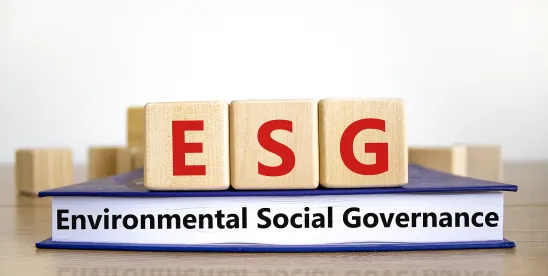Environmental, social, and corporate governance (“ESG”) continues to be a significant focus of not only companies and the boards that run them but also regulators and the public, both of which are increasingly interested in corporate efforts to address ESG. Insurers, too, are placing a greater focus on ESG, both when underwriting policies and assessing coverage for new and emerging risks like ESG exposures. Companies seeking to reduce ESG-related risks should proactively review their insurance program(s), especially their directors and officers (“D&O”) liability policies, and be prepared to explain to insurers what they are doing about ESG.
New ESG Risks Are Emerging
In recent months, regulators have published new ESG-related disclosure requirements. For example,
- In October 2023, California enacted two major climate disclosure laws, which require companies exceeding revenue thresholds to disclose greenhouse gas emissions and publish “climate-related financial risk[]” reports on their website.
- In March 2024, the US Securities and Exchange Commission (“SEC”) adopted final rules requiring companies to disclose climate-related information in their registration statements and annual reports. These rules have since been suspended, showing how quickly requirements can change.[1]
- In May 2024, the European Parliament adopted the much-debated Corporate Sustainability Due Diligence Directive, which will require companies exceeding revenue thresholds to identify and reduce negative effects on human rights and the environment, as well as to adopt a climate change mitigation plan.
Other examples include the US Department of Energy’s official definition of a zero-emissions building, the US Environmental Protection Agency’s designation of two per- and polyfluoroalkyl substances (“PFAS”) as hazardous substances under the Comprehensive Environmental Response, Compensation, and Liability Act of 1980, 42 U.S.C. § 9601, et seq. (“CERCLA”), and import restrictions on products made in China’s Xinjiang region.
Similarly, in recent years, there has been a tidal wave of ESG-related litigation and investigations. In a 2023 report, the United Nations estimated that 2,180 actions concerning climate change were filed globally, including 1,522 in the United States. [2] The SEC, which established an ESG task force in 2021, continues to announce settlements with companies allegedly out of compliance with ESG-related regulations.
The regulatory and litigation risks mentioned above are just some of the potential risks associated with ESG. Others include impacts to corporate reputation, project financing opportunities, and lobbying.
Insurers Care About ESG
Insurance is often the first line of defense in reducing company exposures. In underwriting companies’ insurance programs, insurers often want to consider ESG-related risks. A 2023 report by Marsh found that about 75% of insurers in the UK and European markets are developing underwriting guidelines to address how ESG might be evaluated during underwriting. About 63% of insurers surveyed said that a positive ESG profile could affect underwriting for the company; of those, 65% indicated there could be improvements to policy terms and conditions and 50% indicated that pricing could be reduced. Insurance brokers have reported an increased focus by their insurer clients on ESG, and several prominent insurers have published whitepapers about ESG-related risks.
Similarly, multi-national organizations are addressing how ESG will impact insurance across the globe. In 2020, the United Nation Environmental Programme Finance Initiative (“UNEPFI”) published a guide to managing ESG risks in the insurance space. Similarly, UNEPFI’s Principles for Sustainable Insurance Initiative, which advocates for embedding ESG in insurance-related decision-making, has attracted 165 signatories, including industry-leading insurers and brokers.
The focus by insurance underwriters on ESG may impact coverage available in the marketplace. Companies with robust ESG programs—for example, plans to manage environmental impacts; policies on diversity, equity, and inclusion (DEI); and strategies to implement ESG into investing—may be rewarded with broader coverage and lower premiums. On the flip side, companies that have not proactively addressed ESG concerns may face new restrictions or less favorable coverage. Adding to the uncertainty in defining, managing, and underwriting ESG risks is that ESG programs themselves have become new sources of liability. Public focus on ESG programs may give rise to new litigation risks and even regulatory requirements aimed at curbing certain ESG-related practices.
At the very least, though, insurers have signaled that ESG may be relevant to their decisions about how policyholders are selected and evaluated for coverage.
Companies Should Evaluate Coverage for ESG Risks
In light of growing ESG-related risks and insurer interest in those risks, companies should evaluate their insurance programs to determine their exposure. Companies should also be prepared to explain to their insurers what steps they are taking to address and minimize ESG risks.
Among many possible sources of ESG protection, D&O policies may be the first line of defense. D&O policies typically indemnify companies and their directors and officers for costs incurred defending claims, which may include claims relating to ESG risks. The specific policy language is crucial, as some (but not all) D&O policies cover costs incurred for regulatory investigations, including specific books and records demands. Additionally, private companies can typically obtain better coverage terms (such as coverage for costs relating to subpoenas). D&O policies are especially important for corporate leaders because regulatory authorities can sanction individual directors, and under Delaware law, both directors and officers have the duty of oversight.
Greenwashing claims, for example, may be covered under D&O policies. Greenwashing claims allege that a company misrepresented its environmental friendliness. D&O policies typically cover negligent, but not intentional, misrepresentations by the company, the board, and other decision makers. Whether the alleged misrepresentations were negligent or intentional, therefore falling under an intentional acts exclusion common in D&O policies, may be an important coverage question.
Insurers considering ESG-related claims may raise other D&O exclusions or provisions to limit coverage, such as exclusions for fraud and criminal activity, pollution, or employment acts, highlighting the importance of thorough policy audits by experienced coverage counsel.
Because ESG is so multi-faceted, other types of insurance policies may also cover ESG claims. For example, to the extent ESG practices involve use of technology, cyber policies may apply if claimants allege a failure of cyber security processes. Employment practices liability insurance may cover liabilities arising from DEI-related claims. General liability policies, which typically cover liability for bodily injury and property damage, as well as certain intentional torts under the advertising and personal injury coverage, may be relevant for harm to the environment or consumers (such as from PFAS products).
Companies should carefully review their insurance programs to determine what coverage may be available for ESG claims. That includes examining the wording of D&O policies to determine which claims may be covered (or excluded) and obtaining additional coverage to fill any gaps.
Additionally, your company should be prepared to explain—and, if applicable, highlight—its efforts to reduce ESG risk. Insurers have suggested that a positive ESG profile may result in better coverage at a lower price; the converse could also be true. Working with experienced coverage counsel and insurance brokers can prove especially fruitful to this end.
[1] Because ESG is undergoing public debate, ESG-related regulations may be challenged, causing greater uncertainty about disclosure requirements.
[2] For example, in Spence v. American Airlines, Inc., the US District Court for the Northern District of Texas refused to dismiss a complaint alleging that the plaintiff’s employer had violated ERISA fiduciary duties by investing in funds that consider ESG. No. 4:23-cv-00552-0, 2024 WL 733640, at *5-6 (N.D. Tex. Feb. 21, 2024).






 />i
/>i

